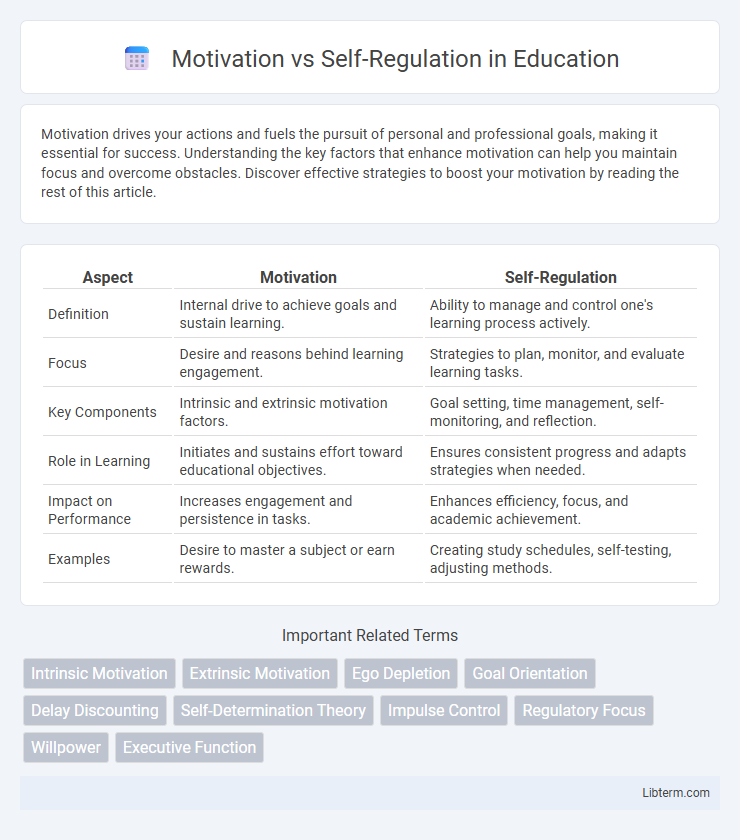Motivation drives your actions and fuels the pursuit of personal and professional goals, making it essential for success. Understanding the key factors that enhance motivation can help you maintain focus and overcome obstacles. Discover effective strategies to boost your motivation by reading the rest of this article.
Table of Comparison
| Aspect | Motivation | Self-Regulation |
|---|---|---|
| Definition | Internal drive to achieve goals and sustain learning. | Ability to manage and control one's learning process actively. |
| Focus | Desire and reasons behind learning engagement. | Strategies to plan, monitor, and evaluate learning tasks. |
| Key Components | Intrinsic and extrinsic motivation factors. | Goal setting, time management, self-monitoring, and reflection. |
| Role in Learning | Initiates and sustains effort toward educational objectives. | Ensures consistent progress and adapts strategies when needed. |
| Impact on Performance | Increases engagement and persistence in tasks. | Enhances efficiency, focus, and academic achievement. |
| Examples | Desire to master a subject or earn rewards. | Creating study schedules, self-testing, adjusting methods. |
Understanding Motivation: Definitions and Key Concepts
Motivation refers to the internal processes that initiate, guide, and sustain goal-directed behaviors, encompassing intrinsic and extrinsic forces. Key concepts include drive, desire, incentive, and arousal, which collectively influence an individual's intensity and persistence in pursuing objectives. Understanding motivation involves recognizing how needs, values, and emotions interact to shape decision-making and effort allocation.
What Is Self-Regulation? Core Principles Explained
Self-regulation refers to the ability to manage emotions, thoughts, and behaviors to achieve long-term goals, distinct from motivation, which drives the initiation of action. Core principles of self-regulation include self-monitoring, goal setting, and impulse control, enabling individuals to adapt their responses in challenging situations. Effective self-regulation is linked to improved academic performance, mental health, and overall well-being by fostering persistence and resilience.
Motivation vs Self-Regulation: Fundamental Differences
Motivation refers to the internal drive that initiates and sustains goal-directed behavior, fueled by desires and needs, whereas self-regulation involves the deliberate control and management of thoughts, emotions, and actions to achieve long-term objectives. While motivation provides the initial energy to pursue goals, self-regulation ensures persistence and adjustment through planning, monitoring, and inhibitory control. Understanding the fundamental differences highlights motivation as the source of impetus and self-regulation as the mechanism for maintaining focus and overcoming obstacles.
The Role of Motivation in Achieving Goals
Motivation drives goal-directed behavior by providing the necessary energy and direction to initiate and sustain effort, playing a critical role in achieving desired outcomes. Self-regulation complements motivation by enabling individuals to control impulses, manage distractions, and maintain focus on long-term objectives. Understanding the interplay between motivation and self-regulation enhances strategies for goal attainment and performance improvement.
How Self-Regulation Shapes Long-Term Success
Self-regulation directly influences long-term success by enabling consistent goal-setting, disciplined habits, and effective stress management essential for persistence. Unlike transient motivation, self-regulation maintains focus and adapts strategies over time, fostering sustained progress and resilience. Research from psychology highlights that individuals with strong self-regulatory skills demonstrate higher academic achievement, career advancement, and overall well-being.
Interaction Between Motivation and Self-Regulation
Motivation fuels goal-setting and persistence, while self-regulation manages the strategies and behaviors needed to achieve those goals, creating a dynamic interplay that enhances performance. Effective self-regulation adapts in response to fluctuating motivation levels, maintaining focus and effort despite challenges or setbacks. This interaction ensures sustained progress by aligning internal drive with controlled actions, optimizing outcomes in academic, professional, and personal contexts.
Barriers to Sustaining Motivation and Self-Regulation
Barriers to sustaining motivation and self-regulation include cognitive overload, emotional exhaustion, and lack of clear goals or feedback. Environmental distractions and inconsistent routines further undermine self-regulatory efforts, reducing persistence and goal attainment. Understanding these obstacles can enhance strategies for maintaining long-term motivation and effective self-management.
Techniques to Boost Motivation and Enhance Self-Regulation
Techniques to boost motivation include setting clear, achievable goals, using positive reinforcement, and visualizing success to enhance mental commitment. To improve self-regulation, practice mindfulness to increase awareness of impulses, implement time management strategies, and develop routines that foster consistency in behavior. Combining goal-setting with regular self-monitoring strengthens both motivation and self-regulation, leading to sustained personal and professional growth.
Real-World Examples: Applying Motivation and Self-Regulation
Motivation drives students to begin learning tasks, such as a college student studying to achieve a scholarship, while self-regulation helps maintain focus and manage time effectively throughout the process, like setting study schedules and minimizing distractions. In the workplace, sales professionals use motivation derived from commission goals to initiate client outreach, whereas self-regulation assists in tracking progress and adjusting strategies to meet targets. Athletes rely on intrinsic motivation to train, complemented by self-regulation techniques such as goal-setting, monitoring performance, and adhering to training routines to enhance their outcomes.
Choosing the Right Approach: When to Focus on Motivation or Self-Regulation
Choosing the right approach between motivation and self-regulation depends on the individual's current challenges and goals. Emphasizing motivation is effective when initial drive or enthusiasm is low, as it provides the necessary energy to start tasks. Focusing on self-regulation becomes crucial once consistent behavior maintenance or overcoming distractions and obstacles is needed to sustain progress.
Motivation Infographic

 libterm.com
libterm.com